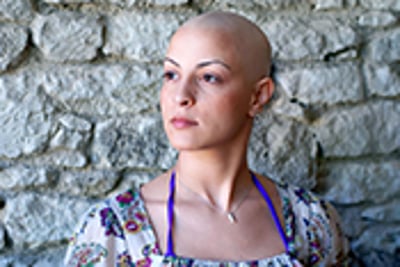In portal: Endometrial Cancer, Categories Cancer Treatment



Relevance: Medium-High
Most relevant for: People interested in using cannabis to relieve treatment side effects.
Study: Cannabis use among breast cancer patients
This study looked at patterns of cannabis use among breast cancer patients who are members of online health communities. Almost half of the study participants reported using cannabis to help manage treatment symptoms and side effects. The study also looked at reasons why patients used cannabis, where they obtained it and whether they perceived cannabis to be safe. While this study only looked at cannabis use among breast cancer patients it is likely results would be similar among patients diagnosed with other types of cancers. (posted 1/25/22)
Este artículo está disponible en español.
READ MORE ›


Relevance: Medium-Low
Most relevant for: People considering a liquid biopsy to screen for cancer
Update: Blood tests called liquid biopsies for cancer screening, monitoring and treatment
Could a simple blood test change cancer detection, treatment and monitoring? Several companies are offering a type of blood test known as a liquid biopsy to detect multiple cancers at their earliest stages, monitor response to treatment and help choose the best treatment. Although progress has been made using liquid biopsies to treat cancer, these tests have not yet been shown to detect cancer early enough to save lives. (posted 9/29/21)
Este artículo está disponible en español.
READ MORE ›


Relevance: Medium-High
Most relevant for: transgender people
Article: Transgender peoples' perspectives of being diagnosed with gender-associated cancer
An ABC News article provides viewpoints and data that conveys the added stress experienced by transgender and gender-nonconforming people when they are diagnosed with gender-associated cancer (e.g., ovarian or prostate cancer) that does not match their gender identity. (posted 9/13/21)
Este artículo está disponible en español.
READ MORE ›


Relevance: High
Most relevant for: People with recurrent or advanced endometrial cancer
Update: Immunotherapy dostarlimab gains FDA approval for treatment of recurrent and advanced endometrial cancer
The FDA has given accelerated approval for the immunotherapy agent dostarlimab (Jemperli) to treat recurrent and advanced endometrial cancer that has a biomarker called mismatch repair deficiency (dMMR). This adds a new treatment option for people with recurrent or advanced endometrial cancer. (posted 5/18/21)
Este artículo está disponible en español.
READ MORE ›


Relevance: High
Most relevant for: People who receive chemotherapy for cancer treatment
Personal Story: Coping with chemotherapy-induced hair loss
Ovarian cancer survivor Stephanie Hess shared her personal story about how she coped with hair loss. This XRAY review also includes treatments to reduce this common side effect of chemotherapy. (9/28/20)
READ MORE ›


Relevance: High
Most relevant for: People who are a member of a racial or ethnic minority group
Article: The importance of racial diversity in clinical trials
This article by journalists Caroline Chen and Riley Wong looks at racial disparities between participation in clinical trials and the population of people with cancer. (11/6/18)
Este artículo está disponible en español.
READ MORE ›


Relevance: Medium-Low
Most relevant for: People with advanced cancers
Study: Cancer “vaccine” injected directly into tumors works in mice
Immunotherapy is treatment that uses the immune system to fight cancer. Still in its infancy, it is a promising therapy that is changing how certain cancers are treated. A new study reports that tumors in lab mice were eliminated when they were injected with two immune system-enhancing agents. This new approach is called in situ (at the original site) vaccination because the injections are given directly into the tumors. It worked on several different types of mouse tumors, including lymphomas and breast tumors. This approach may be safer than conventional immunotherapy because it uses very low doses of the agents and it does not require tumors to have particular markers. (02/23/18)
READ MORE ›


Relevance: High
Most relevant for: People diagnosed with or concerned about their risk for cancer
Article: FDA busts myths of preventing and treating cancer by eating apricot kernels, herbs, and other ingredients
Maggie Fox (NBC News) writes about a new FDA report that warns of 14 "fraudulent” cancer products claiming to either cure or treat cancer (1). The companies that sell these products claim that many of them also prevent cancer, but are they safe or effective? (6/26/17)
READ MORE ›


Relevance: High
Most relevant for: Patient undergoing chemotherapy
Study: Does scalp cooling help prevent hair loss after chemotherapy?
Hair loss is one of the most recognized and distressing side effects of some chemotherapies. Two studies looked at the use of scalp cooling therapy to help reduce hair loss after chemotherapy for early-stage breast cancer. (5/15/17)
Update: Based on data from clinical trials, the FDA approved Dignicap scalp cooling device for treatment in patients diagnosed with solid tumors who are receiving chemotherapy.
READ MORE ›


Relevance: Medium
Most relevant for: People diagnosed with advanced cancer
Article: A cancer patient’s tumor is genetically profiled—how does that info help treatment?
Jessica Wapner's Scientific American article explores the difficulties of making the vast amount of information acquired from tumor gene tests useful to patients and physicians. (9/20/16). Update: THIS INFORMATION HAS BEEN UPDATED. In late 2017, the FDA approved two separate tumor profiling tests to help guide treatment choices. The FoundationOne CDx (F1CDx) genomic test has been approved to test for 15 different targeted therapies used to treat five types of cancer, including ovarian, colorectal, lung, breast and melanoma. The FDA also approved the MSK-IMPACT and developed for use by Memorial Sloan Kettering Cancer Center (MSKCC) to scan tumor samples for 468 different cancer-associated mutations or alterations.
READ MORE ›